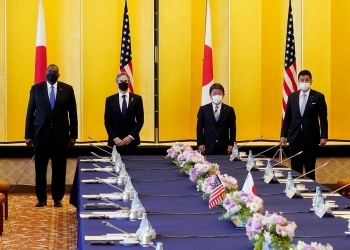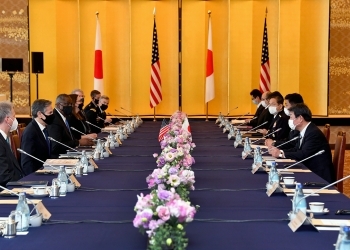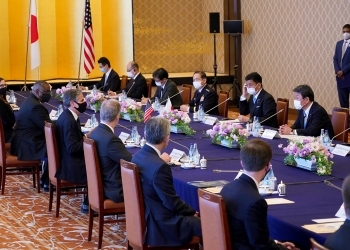Japan-United States of America Relations
Japan-U.S. Security Consultative Committee (Japan-U.S. "2+2")
March 16, 2021



On March 16, commencing at 15:00 p.m. for approximately 1 hour and 30 minutes, the Japan-U.S. Security Consultative Committee (SCC) (Japan-U.S. "2+2") was convened in Tokyo, Japan. The meeting was attended by Mr. MOTEGI Toshimitsu, Minister for Foreign Affairs, and Mr. KISHI Nobuo, Minister of Defense, from the Japanese side, and the Honorable Antony Blinken, Secretary of State, and the Honorable Lloyd Austin, Secretary of Defense, from the U.S. side. The overview of the meeting is as follows (following the meeting, Joint Statement(PDF) was released).
was released).
 was released).
was released).1 Overview
The four ministers reaffirmed that the Japan-U.S. Alliance remains the cornerstone of peace, security, and prosperity in the Indo-Pacific region, and renewed the unwavering commitment of both countries to the Japan-U.S. Alliance. Amid growing geopolitical competition and challenges such as COVID-19, climate change, and revitalizing democracy, the four ministers concurred to promote a free and open Indo-Pacific and a rules-based international order.
In light of the severe security environment, the four ministers concurred to further deepen the coordination to strengthen the deterrence and response capabilities of the Japan-U.S. Alliance. Japan expressed its resolve to enhance its capabilities to bolster national defense and the Alliance. The U.S. underscored its unwavering commitment to the defense of Japan through the full range of its capabilities, including nuclear.
In light of the discussion at the Japan-U.S. "2+2" and this Joint Statement, the four ministers instructed their respective offices to advance concrete works to strengthen the Alliance. They concurred to hold another SCC later this year to confirm their outcomes.
In light of the severe security environment, the four ministers concurred to further deepen the coordination to strengthen the deterrence and response capabilities of the Japan-U.S. Alliance. Japan expressed its resolve to enhance its capabilities to bolster national defense and the Alliance. The U.S. underscored its unwavering commitment to the defense of Japan through the full range of its capabilities, including nuclear.
In light of the discussion at the Japan-U.S. "2+2" and this Joint Statement, the four ministers instructed their respective offices to advance concrete works to strengthen the Alliance. They concurred to hold another SCC later this year to confirm their outcomes.
2 Regional Security Environment
The four ministers held candid exchange of views and aligned their recognition on the security environment of the region.
- The four ministers acknowledged that China's behavior, where inconsistent with the existing international order, presents political, economic, military, and technological challenges to the Alliance and to the international community. They also committed to opposing coercion and destabilizing behavior toward others in the region, which undermines the rules-based international system.
- The four ministers opposed any unilateral action that seeks to change the status quo, including in the East China Sea and the South China Sea, and expressed serious concerns about the China's Coast Guard law. The Japanese side expressed its resolve to defend its territory with every means. The four ministers reaffirmed that Article V of the Japan-U.S. Security Treaty applies to the Senkaku Islands and affirmed that both nations oppose any unilateral action that seeks to undermine Japan's administration of these islands.
- The four ministers reiterated their objections to China's unlawful maritime claims and activities in the South China Sea.
- The four ministers underscored the importance of peace and stability in the Taiwan Strait. The ministers also shared serious concerns regarding the human rights situation in Hong Kong and the Xinjiang Uyghur Autonomous Region.
- The four ministers affirmed the importance of the full implementation of UN Security Council resolutions towards the complete denuclearization of North Korea, and concurred to continue the cooperation between Japan and the U.S., as well as among Japan, the U.S. and the Republic of Korea. They also confirmed the necessity of immediate resolution of the abductions issue.
- The four ministers confirmed their cooperation among Japan, the U.S., Australia and India. They also pledged to work with the Association of Southeast Asian Nations (ASEAN), affirming their strong support for its centrality and unity, as well as for the ASEAN Outlook on the Indo-Pacific.
3 Strengthening Bilateral Security and Defense Cooperation
Recognizing the increasingly serious regional security environment, the four ministers concurred to further deepen the coordination to strengthen the deterrence and response capabilities of Japan-U.S. Alliance by consulting on Alliance roles, missions, and capabilities.
- The four ministers concurred to closely align their strategies and policies of the two countries, as the U.S. undertakes various policy reviews.
- The four ministers concurred to deepen defense cooperation across all domains and to bolster extended deterrence. They also highlighted the importance of cooperation in domains such as space and cyber, as well as further strengthening information security.
- The four ministers reiterated that realistic bilateral and multilateral exercises and training are necessary to maintain the Alliance's operational readiness and deterrent posture, as well as to meet future challenges.
4 Force Posture and U.S. Forces in Japan
The four ministers shared the view that they will steadily implement the realignment of U.S. forces in Japan, from the perspective of mitigating the impact on local communities including Okinawa, while maintaining the deterrence of the Japan-U.S. Alliance.
- The four ministers welcomed progress on force realignment efforts and reaffirmed their commitment to implementing the current arrangements in ways that maintain operational readiness and a sustainable presence, while mitigating the impact on local communities.
- The four ministers reconfirmed that the plan to construct the Futenma Replacement Facility at the Camp Schwab-Henokosaki area and in adjacent waters is the only solution that avoids the continued use of Marine Corps Air Station Futenma, and committed to completing construction as soon as possible.
- Regarding Host Nation Support, having agreed to a one-year extension amendment to the current Special Measures Agreement, the four ministers instructed their negotiators to work toward a new mutually beneficial multi-year agreement.
- The Japanese side stressed the importance of steadily implementing the realignment of U.S. forces in Japan, and requested the U.S. side for safe operations of the U.S. forces with utmost consideration to the impact on local communities as well as appropriate responses to incidents and accidents.
- The Japanese side reiterated their appreciation for the assistance provided by the U.S. in the wake of the Great East Japan Earthquake. In remembrance of the lives lost, the four Ministers reaffirmed the spirit of cooperation of the Japan-U.S. Alliance.

